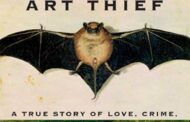Book Short
A Fortnight in September
By R.C. Sherriff
Review by Stephanie Miller

Nothing really happens in this novel, “The Fortnight in September” by R.C. Sherriff. A family takes their annual two-week holiday at the seashore. At the same time, everything happens. Everything human is covered in the character dialog, coming of age struggles, relationship tensions, and pure loving kindness.
It’s got the flavor of a different age. That is not surprising as it was first published in 1931 and has been republished as part of the extraordinary Persephone series, which celebrates forgotten writers of the early 20th Century.
The beauty of this book is that it’s written in the language of the people in it. They are earnest, hard-working, capable people who diligently plan these precious two weeks in order to suck every last bit of happiness and comfort from them, despite the strain on their budget. Everything they do – bathe, walk on the promenade, listen to music, visit the arcade, pop into the local pub, sit comfortably by the fire after supper – they have done every year they come to this same seaside inn. It’s extraordinary how the ordinary is so interesting. I found myself totally engrossed in their lives and worries and happiness.
I am not the only one. It sold an exceptional 20,000 copies in the first two months. The author wrote in his autobiography, “Why it took on is anybody’s guess. Mainly, perhaps because the story was easy to read, with nothing grand or pretentious about it.”
This book just made me happy.
Consider this excerpt:
“They simply played catch to begin with – standing around in a wide circle and throwing to one another. Now and then Mr. Stevens, instead of throwing the ball on in the usual way would jerk it quickly back the way it came to make the others keep on the alert, and sometimes when one of the children missed it, and had to chase it down the sands towards the sea, Mr. Stevens would rest his hands on his hips and gaze round.”
Managing their annual budget to allow this holiday is a source of pride to Mr. Stevens, and although his wife is happy to be away from her housekeeping, she never tells him that she isn’t really a beach person. They each compromise with goodwill, not wanting to spoil the holiday for anyone else, which compounds their own enjoyment. The narrative alternates voices, so the reader gets to hear all their inner thoughts, bringing us closer to each.
This novel brings us back to the deep breaths of sea air that we’ve enjoyed on our own holidays, and perhaps that is part of the secret. My enjoyment of their enjoyment is tied to my own happy memories of good times by the sea.
Micro Shorts
‘Patience’ by John Coates
This is another of the Persephone series of forgotten writers of the twentieth century. Aptly named Patience is a dutiful wife who discovers after seven and a half years of marriage that she can actually control her own situation by being less dutiful and more responsive to her own needs and sexual desires. It’s an innocent’s coming of age tale, very funny, and wry – and despite the long-ago publishing date, quite relevant today. If you are checking out Persephone online (the bookstore is in London), I also recommend anything by Dorothy Whipple and the bestseller, “Miss Pettigrew Lives for a Day.” Also explore what Persephone recommends.
‘Five Decembers‘ by James Kestrel
A Honolulu police detective chasing a criminal leaves for Japan on December 5, 1941, and ends up spending the war as a fugitive. He never forgets who he’s chasing and why, and eventually makes his way back to Hawaii to find his former life in tatters, and then back to Japan again following up on the case in what is now a personal vendetta. This is a fast paced, suspenseful detective story with a very haunting storyline. It’s part of the well curated Hard Case Crime series of “hard boiled crime fiction.”
‘David Copperfield‘ by Charles Dickens
I read this for the first time this month (I know!), in preparation to read “Demon Copperhead” by Barbara Kingslover (I’ll keep you posted). It’s the most autobiographical of Dickens’ books. It’s ponderous in words – as per the style of the day – but you can’t beat Dickens for memorable characters. His despicable characters are truly evil. His loving characters are wise and generous. And his eccentrics are charming but completely off balance.
Knowing from his “My Early Times” memoir that some of these characters are based on his real life (the Micawbers after his parents, Dora on his first love, and Agnes on his ideal of the perfect woman, whom Dickens says he never met in his life) makes it even more interesting. In fact, Dickens lifted whole passages from an early draft autobiography (never published) into the chapters of David the Younger. When you have a hankering for a classic, this is one to keep you entertained during a long snowy weekend (if winter ever comes to Portland this year).





